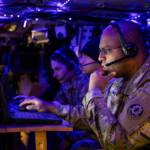
The Government Accountability Office (GAO) has denied Oshkosh Defense’s [OSK] protest of the Army’s award of the potential $9.7 billion Joint Light Tactical Vehicle follow-on contract to AM General. “In denying the protest, GAO concluded that the Army reasonably evaluated proposals in accordance with the [Request for Proposals’] evaluation criteria, and that any judgments made were consistent with and adequately supported by the content provided in written proposals or observed as part of site visits [conducted] during the course of…

 By
By 











